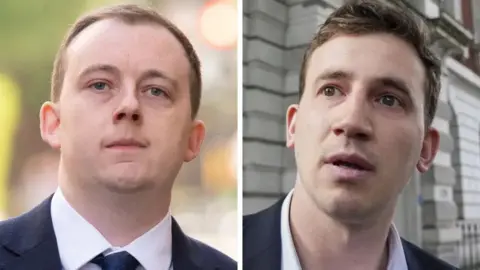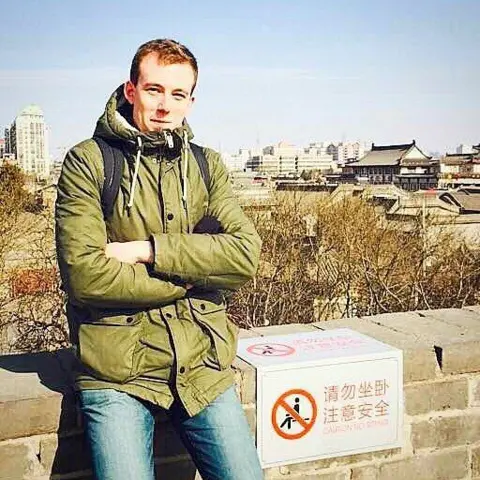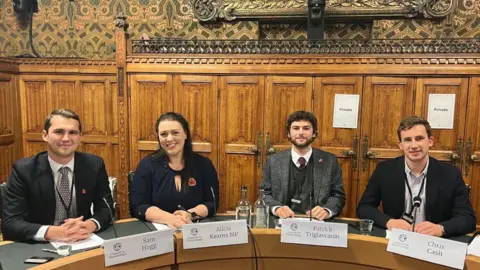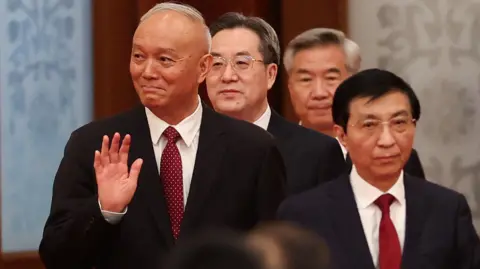Daniel SandfordUK correspondent
 PA Media
PA MediaChristopher Cash and Christopher Berry were accused of collecting insider information about UK politics and government policy, and passing it to a Chinese intelligence agent, who then forwarded it to Cai Qi, one of the most senior politicians in China. Cai is often referred to as President Xi Jinping’s right-hand man.
Both Mr Cash and Mr Berry completely denied the charge under Section 1 of the Official Secrets Act 1911. The Crown Prosecution Service (CPS) dropped the case against the pair last month after deciding the evidence did not show China was a threat to national security.
The two men met while teaching in China.
Mr Berry stayed behind, but Mr Cash, whose other love was politics, got a job in the House of Commons – first as a researcher and then as the director of the China Research Group, working closely with MPs like Tom Tugendhat, Alicia Kearns and Neil O’Brien.
 Christopher Berry
Christopher BerryIn a statement released through his solicitor, Mr Cash told the BBC: “I have, for a long time, been concerned by the influence of the Chinese Communist Party (CCP) in the United Kingdom and, prior to these false allegations, was working to inform Parliamentarians and the public about those risks.”
Mr Cash and Mr Berry would talk and exchange messages between Westminster and China, according to the first of three witness statements by the deputy national security adviser Matt Collins to the CPS – released by the government on Wednesday.
For example, according to Mr Collins’ statement, Mr Cash told Mr Berry in June 2022 that he thought Jeremy Hunt would pull out of the Tory leadership race.
In July 2022, he allegedly sent a voice note saying that Tugendhat would almost certainly get a job in Rishi Sunak’s cabinet. Both these pieces of information ended up in reports that Mr Berry submitted to a man called “Alex”, who the prosecution said was a Chinese intelligence agent.
In his statement, Mr Cash said he was aware “a small amount of the information” he was sending to Mr Berry was being passed on. But he thought Mr Berry was working for “a strategic advisory company” helping clients “invest in the UK”.
Mr Cash said the information he gave Mr Berry was publicly available or “just political gossip that formed part of the everyday Westminster rumour mill”.
In a statement given to BBC News via his lawyer on Thursday, Mr Berry gives a similar account.
He said his reports were “provided to a Chinese company which I believed had clients wishing to develop trading links with the UK”.
Those reports “contained no classified information”, Mr Berry said, and “concerned economic and commercial issues widely discussed in the UK at the time and drew on information freely in the public domain, together with political conjecture, much of which proved to be inaccurate”.
 Council on Geostrategy
Council on GeostrategySome of the information was not for passing on. In the note to Mr Berry about Hunt, Mr Cash wrote: “v v confidential (defo don’t share with your new employer)”. Despite that, it was included in one of Mr Berry’s reports, according to one of Mr Collins’ statements.
Mr Cash and Mr Berry communicated using encrypted messaging apps.
Mr Collins’ first statement says that, after one exchange in December 2022, Mr Berry told “Alex” that the Foreign Secretary James Cleverly did not think sanctions would be effective in blocking imports from Xinjiang, the province where there are human rights abuses of the Uyghur population.
There were also a series of exchanges about meetings between Tugendhat, Kearns and Taiwanese defence officials, according to Mr Collins.
All of these exchanges ended up in a series of reports that Mr Berry submitted to “Alex” with titles like “Taiwan-perception-within-parliament” and “Import_of_Products_of Forced_Labour_from Xinjiang”.
Those reports then ended up with Cai Qi, and he seems to have been so pleased about the information that, in July 2022, Mr Berry met Cai. Mr Cash sent him a message saying: “You’re in spy territory now.”
According to Mr Berry, Cai asked “specific questions about each MP within the Conservative leadership election one-by-one”, Mr Collins said in his statement.
 Reuters
ReutersAt times – according to Mr Collins – “Alex” “tasked” Mr Berry with collecting specific information. On one occasion, the turnaround time was just 13 hours, he said in his first statement.
But both men categorically deny knowingly spying for China.
“I routinely spoke [to] and shared information with Christopher Berry about Chinese and British Politics,” he said in the statement given to BBC News on Wednesday night.
“He was my friend and these were matters we were both passionately interested in. I believed him to be as critical and concerned about the Chinese Communist Party as I was.
“It was inconceivable to me that he would deliberately pass on any information to Chinese intelligence, even if that information was not sensitive.”
Mr Cash said he had been “placed in an impossible position” by the release of Mr Collins’ statements, which were “devoid of the context that would have been given at trial”, where they would have been subject to a “root and branch challenge”.
He insisted that the assessments “would not have withstood the scrutiny of a public trial”.
Mr Berry said he had “consistently denied any wrongdoing” but had found himself “subjected to a trial by media” and caught in the middle of various groups seeking “to use the case to their political advantage”.
He said he did not accept that, by making the reports, he was “providing information to the Chinese intelligence services, nor is it tenable that the provision of such material could, in any sense, be considered for a purpose prejudicial to the safety or interests of the state”.
He added: “This would have been one of many issues raised with the jury during a trial.”

